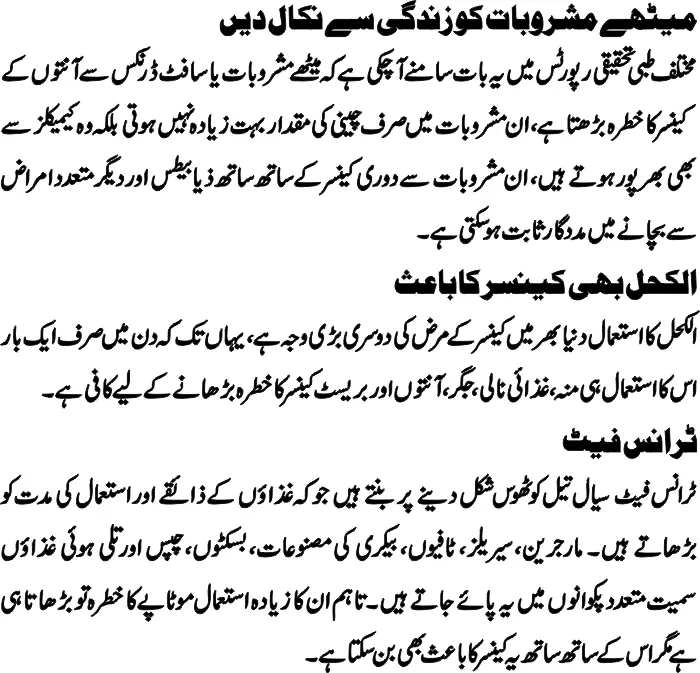
In recent years, the alarming rise in cancer cases worldwide has become a cause for concern. The pervasive nature of this disease has led scientists and healthcare professionals to explore the factors contributing to its rapid spread. In this article, we will delve into why cancer seems to be proliferating at an unprecedented rate and, more importantly, explore practical steps to prevent and combat this formidable adversary.
To comprehend the surge in cancer incidence, it is imperative to first acknowledge the multifaceted nature of the disease. Cancer, characterized by uncontrolled cell growth, can manifest in various forms, affecting different organs and tissues. The factors contributing to its proliferation are equally diverse, ranging from lifestyle choices to environmental influences.
Simple Cancer Prevention Tips for a Safer Future (Urdu)

1. Lifestyle Choices:
The modern lifestyle, characterized by sedentary habits, poor dietary choices, and increased stress levels, plays a pivotal role in the surge of cancer cases. Unhealthy eating habits, such as the consumption of processed foods high in additives and preservatives, contribute to the accumulation of toxins in the body, creating a conducive environment for cancer cells to thrive.

2. Environmental Factors:
The environment we live in can also be a silent contributor to the rising tide of cancer. Exposure to pollutants, carcinogens, and harmful chemicals present in the air we breathe, the water we drink, and the products we use daily can significantly elevate the risk of developing cancer. Identifying and mitigating exposure to these environmental hazards is crucial in curbing the spread of this disease.

3. Genetics and Hereditary Factors:
While lifestyle and environmental factors play a substantial role, it is essential to recognize the influence of genetics in cancer susceptibility. Certain individuals may carry genetic mutations that predispose them to specific types of cancer. Understanding one’s family history and undergoing genetic testing can provide valuable insights, enabling proactive measures for prevention.
4. Early Detection and Screening:
Timely detection remains a cornerstone in the fight against cancer. Regular screenings and health check-ups can aid in identifying potential risks or early-stage malignancies. Early intervention significantly enhances the chances of successful treatment, underscoring the importance of proactive healthcare measures.
5. Vaccination Against Viral Infections:
Several types of cancer are linked to viral infections, such as human papillomavirus (HPV) and hepatitis B and C. Vaccination against these viruses can substantially reduce the risk of developing associated cancers. Public health initiatives aimed at increasing vaccination rates are pivotal in preventing virus-induced cancers.
6. Sun Protection Measures:
Skin cancer, primarily caused by exposure to harmful ultraviolet (UV) rays from the sun, is a significant contributor to the overall cancer burden. Practicing sun protection measures, including the use of sunscreen, protective clothing, and avoiding prolonged sun exposure, is essential in minimizing the risk of skin cancer.
7. Healthy Diet and Physical Activity:
Adopting a healthy lifestyle is paramount in cancer prevention. A balanced diet rich in fruits, vegetables, and whole grains provides essential nutrients and antioxidants that fortify the body’s natural defenses. Regular physical activity not only contributes to weight management but also helps regulate hormonal balance, reducing the risk of hormone-related cancers.
8. Smoking Cessation and Limiting Alcohol Intake:
Tobacco use remains a leading cause of various cancers, including lung, throat, and mouth cancers. Quitting smoking and limiting alcohol intake are crucial lifestyle modifications that can significantly decrease the risk of developing these types of cancer. Support programs and resources are available to assist individuals in their journey towards a tobacco-free and healthier lifestyle.
FAQs
Q1: Can stress contribute to the development of cancer?
A: Yes, chronic stress can potentially affect the immune system and create an environment conducive to cancer growth. While stress alone may not directly cause cancer, managing stress through relaxation techniques and a healthy lifestyle is essential for overall well-being.
Q2: Are there specific foods that can help prevent cancer?
A: Yes, certain foods are known for their cancer-fighting properties. Incorporating a diet rich in fruits, vegetables, and whole grains, along with antioxidants and anti-inflammatory foods, can contribute to reducing the risk of cancer.
Q3: Is there a link between mobile phones and cancer?
A: The scientific consensus to date suggests no conclusive evidence of a direct link between mobile phone use and cancer. However, limiting exposure to radiofrequency emissions by using hands-free options and being mindful of screen time is recommended for overall health.
Q4: How does alcohol consumption contribute to cancer, and is moderation key?
A: Excessive alcohol consumption is linked to an increased risk of certain cancers, including those of the liver, breast, and esophagus. Moderation is indeed key; limiting alcohol intake and understanding individual tolerance levels can play a significant role in reducing cancer risk.
Q5: Can certain occupations increase the risk of cancer?
A: Yes, certain occupations expose individuals to carcinogens and other hazards, potentially increasing cancer risk. Jobs involving exposure to asbestos, chemicals, or radiation may pose a higher risk. Occupational safety measures and regular health check-ups are crucial for those in high-risk professions.
Q6: What role do hormones play in cancer, especially in women?
A: Hormones can influence the development of certain cancers, particularly in women. Hormone-related cancers, like breast and ovarian cancers, may be affected by factors such as hormone replacement therapy and oral contraceptives. Regular check-ups and discussions with healthcare providers help manage these risks.
Q7: Does the use of talcum powder increase the risk of ovarian cancer?
A: Some studies suggest a potential association between long-term genital talcum powder use and a slight increase in ovarian cancer risk. However, more research is needed to establish a definitive link. As a precaution, some individuals choose talc-free alternatives.
Q8: Are there alternative therapies or supplements that can prevent cancer?
A: While a healthy lifestyle is crucial, there is no conclusive evidence that alternative therapies or supplements can prevent cancer. It’s essential to consult with healthcare professionals before incorporating any complementary approaches and focus on evidence-based preventive measures.
To sum it up, the increase in cancer cases globally is a complicated problem with many factors. It’s important to know how our lifestyle, surroundings, genes, and preventive actions all play a part. Creating effective plans to stop cancer involves being proactive—getting regular check-ups, making healthy choices, and getting vaccinated against avoidable infections. People can make a big difference in preventing cancer by taking these steps. It’s a team effort involving communities, healthcare experts, and decision-makers to create a future where cancer isn’t such a big threat but something we can overcome together.







